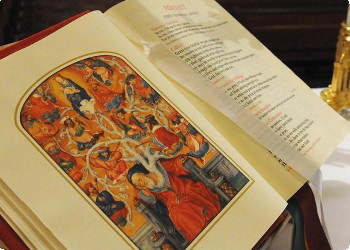He first found his own brother Simon
1 Jn 3,7-10; Ps 97; Jn 1,35-42
4 JANUARY
From the testimony given by John to Jesus the Lord, a first fruit is born immediately. The forerunner is with two of his disciples. He fixes his gaze on Jesus and says: Behold the Lamb of God. The two disciples, hearing their teacher speak like this, follow Jesus and go after Him. They dwell with Him a whole day. What happened, what they heard and saw and what Jesus said to them, we do not know. But one thing is clear to our spirit: the passage or substantial change that Andrew makes to the testimony of John. Jesus is not proclaimed as the Lamb of God that takes away the sin of the world or as the Servant of the Lord who is charged with our iniquities. From the Lamb and the Suffering Servant he passes to testify that Jesus is the Messiah. It is a substantial passage, not in opposition to the Lamb of God, but in addition to that truth. Jesus is together in his Person Lamb of God, Suffering Servant and Messiah. The Messiah is the Servant of the Lord. The Servant of the Lord is the Messiah. He will not only be the man of suffering who quite knows the suffering, but the King who will take upon himself all the suffering of the world. He will take it for its atonement.
These two revealed truths are already sufficient to give the messianism of Jesus a totally different meaning from the way it was thought, imagined and taught by the contemporaries of Jesus. A messianism of violence, war, conquest of lands, liberation of the fathers’ soil, submission and slavery does not belong to Jesus. He is delivered to suffering, but also to the one who voluntarily surrenders. Even for our times only these two truths about Jesus would suffice, to give our pastoral praxis a very different direction. Instead of writing theologies for the earth one could write theologies for heaven. Instead of pastoral care for the body, it would be done for the soul and the spirit. If Jesus is the Christ of God who voluntarily offers himself to suffering in order to take away the sin of the world, to expiate and redeem it, might there be only one of his disciples who can think differently? If He calls poor, miserable, afflicted, disconsolate, naked and hungry to accept their condition, without rebelling against it, but living it in the greatest obedience to the Law of the Lord, according to the Word of Jesus revealed in his Gospel, can we think of a different sequel? Only by taking away the sin of the world do we remove the consequences of death that it produces. But we want to let sin prosper and we complain against its fruits of death. Every Christian in Christ must remove sin.
The next day John was there again with two of his disciples, and as he watched Jesus walk by, he said, “Behold, the Lamb of God.” The two disciples heard what he said and followed Jesus. Jesus turned and saw them following him and said to them, “What are you looking for?” They said to him, “Rabbi” (which translated means Teacher), “where are you staying?” He said to them, “Come, and you will see.” So they went and saw where he was staying, and they stayed with him that day. It was about four in the afternoon. Andrew, the brother of Simon Peter, was one of the two who heard John and followed Jesus. He first found his own brother Simon and told him, “We have found the Messiah” (which is translated Anointed). Then he brought him to Jesus. Jesus looked at him and said, “You are Simon the son of John; you will be called Kephas” (which is translated Peter).
An error that today is committed in the witness that is made to Christ Jesus – besides of course all those of falsehood, lie, heresy and slander on his Person – is to think that it is enough to speak of Jesus. Andrew speaks of Jesus to his brother, but also leads him to Him. Leading to Christ is obligatory, necessary and indispensable, as it is obligatory to invite to conversion, to faith in the Gospel, to let one be baptized and to be born of water and the Holy Spirit. All this is necessary because the body of Christ is to be formed every day with the addition of new members. The greatest sin today against Christ is to no longer form the body of Christ. It is to think that it is enough to announce a word that invites to love, to forgiveness and to peace. No. Everything happens in Christ, through Christ and with Christ, as members of his body, branches of his vine.
Mother of God, Angels and Saints ensure that the Christian understands and makes the body of Christ.





